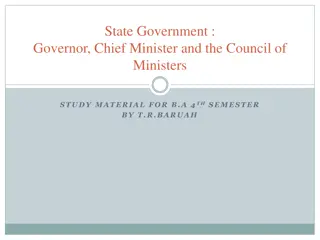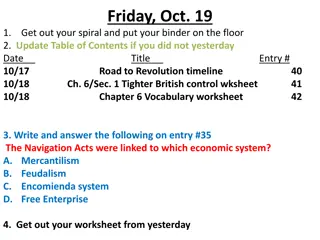The Remarkable Journey of Robert Clive: From Clerk to Governor in Colonial India
Robert Clive, known for his military prowess and statesmanship, rose from a humble clerk to a significant figure in the British East India Company. His strategic victories in battles like Arcot, Plassey, and Buxar shaped British colonial rule in India. As a statesman, he implemented civil reforms and acquired significant rights for the Company, impacting the administration of Bengal, Bihar, and Orissa.
Download Presentation

Please find below an Image/Link to download the presentation.
The content on the website is provided AS IS for your information and personal use only. It may not be sold, licensed, or shared on other websites without obtaining consent from the author.If you encounter any issues during the download, it is possible that the publisher has removed the file from their server.
You are allowed to download the files provided on this website for personal or commercial use, subject to the condition that they are used lawfully. All files are the property of their respective owners.
The content on the website is provided AS IS for your information and personal use only. It may not be sold, licensed, or shared on other websites without obtaining consent from the author.
E N D
Presentation Transcript
Robert Clive As a General Joined-service of-EIC-as Writer Clerk-1743- reached Madras- 1744 Hero of Arcot- He suggested to Governor of Madras that he should be given some troops to capture Arcot- Chanda Sahib army was defeated by Clive and also Defeated Chanda Sahib forces at Trichinoploy- Went to England after the Victory of Second carnatic War- Clive again sent to Indaia as a Governor of Fort St. David- 1756-
Clive in Battle of Plessy(1757) Conquest of Bengal- Siraj Ud-Daula- Nawab of Bengal Defeated with the help of Admiral Watson- and rebel commander Mir Jaffer was made as Nawab- Trough Battle of Plessy(1757)-Mir Jaffer was made near Puppet in the hands of Company-Rich provinces Bengal and Bihar came to the control of English- Battle of Plassey in 1757 made company the masters in Bengal and Bihar-
First Governorship of Bengal-(1757-1760) Third Cranatic War When General Lally recalled Bussy- Clive took advantage sent his troop to capture Northern Circars 1759-won the battle too- Second Governership(1760-1765)- Battle of Buxar(1764)- Treaty of Allahabad(1765)- settlement with Shuja-ud dwala of Oudh and Mugul Emperor Shah Alam II- Important outcomes-Mughual give Diwani Right to company in the regions of Bengal- Bihar-Oudh was made us buffer state between Company and Mughal
As a Statesman Civil Reforms Abolished-private trade of Company servants- Double Bhatta (field allowance was abolished)- Dual Government- Company acquired Diwani right of Bengal, Bihar and Orissa- as a result of Treaty of Allahabad(1765)-Revenue collection was kept in the hands of Company- Administration was left in the hands of Nawabs.























